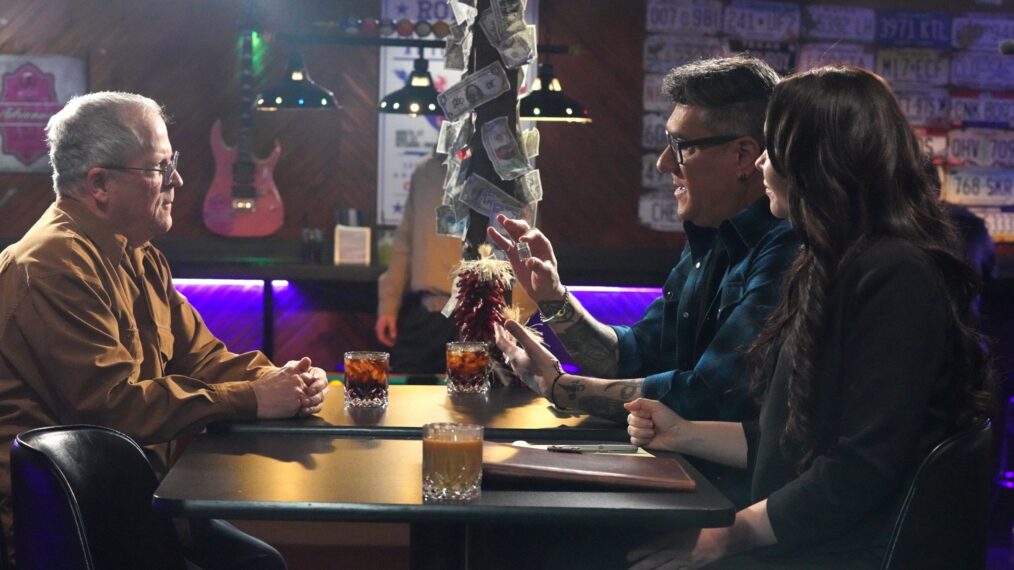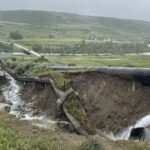Do you believe in aliens? If the answer is no, Alien Encounters: Fact or Fiction may get you second-guessing. With reports of UAPs (unexplained aerial phenomena) on the rise, UFO experts Mitch Horowitz and Chrissy Newton are using scientific data and research to dissect real encounters with extraterrestrial activity to determine whether or not they are explained.
The two head to the epicenter of Roswell, New Mexico to meet with those who have potentially had these otherworldly interactions. From what they hear, they’ll use various intelligence, technology, and tools to investigate. Other developments including the release of declassified UFO documents and technology advancements have changed the game.
After gathering all their findings they’ll present their final verdict, which may or may not be what the person coming to them wants to hear. Here Newton, a writer for The Debrief and podcast host, delves into what makes this Discovery Channel offering different from others within the UFO show universe.
When was the moment you started to believe in UFOs and became interested in the topic?
Chrissy Newton: It really started when I was a little girl. My dad had a UFO experience when he was between the age of 18 and 20. He was with a group of friends in Northern Canada in Ontario. He ended up taking a photo with a group of people and showed me that photo as a little girl. It lit up everything inside of me. I was so curious about his journey finding out what he saw with that group of people. Asking the question during a time of major ridicule and stigma around the UFO topic. You couldn’t really talk about it with many people. He was always trying to read books or watch shows and whatever he could get his hands on.
When I was a little girl, I watched him do that. To this day, I watch him do that. It really sparked my interest in it. Later on in life, I was 20-something, I asked my dad, “Do you want to go to a UFO conference?” He was like, “Yeah.” I’m at the age where I could do my own thing and travel as a young adult. My parents bought a condo in Arizona where they were snowbird-ing. I looked it up, and no joke, saw the biggest UFO conference in the world at the time was coming there. The International UFO Congress was about 40 minutes from their place. We booked the tickets. That started my journey into the field. To this day, it’s something I talk about with my dad. We might have different opinions now, but he really started my interest.
Discovery Channel
Tell me about how this show came together and what goes into your investigations.
It all happened so fast. I’ve done other television before, but nothing of this caliber. It was something new and different that had not been done before. Some people might have some questions about how to find out if something is fact or fiction. I look at it from a journalistic perspective. We’re looking for facts and different types of evidence. We might not have proof but evidence. We’re analyzing and looking for experts in helping to analyze the material. My job with my podcast Rebelliously Curious is to interview experts. I’m always asking questions and looking for the core truth. We also look at different science or technology that will back explanations or point to an exploration of what might be happening.
Mitch and I want to come to some answers for people who are having different experiences to the third and fourth kind that are unbelievable. They really touch your heart. A lot of the people I spoke to, I knew them before they came on the show digitally. They followed me or are from UFO Twitter or other spaces adjacent to this topic. You see how this affects them and how real it is to them. We talk to experts and listen to the testimonies to come to some sort of idea. I can’t say conclusion because we really can’t give that. Maybe having an idea though gives them some comfort. Maybe not.
There is something to ontological shock, which is real. That’s something we have to keep in mind. Their worlds can shift when you’re talking to them about something they’ve seen that is unexplainable. It’s not just we just told them they saw a spaceship. It’s more than that. People’s reactions are very different in how they perceive their own reality and space and time as well. It was a learning curve working with different people in different degrees about their experience. It was also wonderful, and challenging at many times. I learned a lot. And I think a lot of people doing this show did as well.
What would you say is your approach when you’re telling someone what they think they saw isn’t probably what they saw?
When I go in, I don’t know how they are going to react. My job is to hopefully give it to them the best way that sits with them. I care about people. It’s important to me that people not leave in pieces but in understanding. I think everyone experiences things in different ways. This show will show that. This is not a black-and-white topic. There is so much gray and nuance. I think everyone will learn from this as well throughout the journey. Some people want to know what it is and some people want it to be a UFO. It’s about holding people with care and comfort within a safe space.
The venue where you speak to these folks is Variety Bar & Lounge. What’s the significance of this place in Roswell?
Roswell is known for the Roswell crash. It’s one of the most epic stories within pop culture in modern-day history and within the UFO phenomenon. It is the backdrop. The local bar within Roswell. It’s the only actual bar there that doesn’t have food. So it is literally a watering hold. It has been a staple within that community. People from all walks of life walk into that bar They have a lot of locals. They have tributes to their locals. There are a lot of stories that have been shared at the Variety. I think that’s why Discovery and the production team chose there because it has been there longer than most establishments.
You hear about alleged abductions, metal believed to be from a UFO crash site, and everything in between. What are you most excited about for viewers to see this season?
I don’t want to give spoilers, but I will say I think something I hope the viewers people walk away with is how to identify a flying object. My job is to talk about the five observables. I want them to know about anti-gravity, trans-medium, instant acceleration, [hypersonic velocities without signatures], and cloaking. All these different types of observables where we can potentially say, “It is a UFO.” That’s important to know because we want people to identify flying objects. It helps with military observation and if other things are flying into our airspace. I think it gives people the ability to critically think. To take what they see and then give an educated guess. You’d be surprised how many people think balloons are UFOs. It’s not just a Roswell thing.
That ability to do that for the average person and add to the data. People have all these cell phones and information that can be put into AI and be looked at through cross-data. To be able to find the relations and potentially point to something that may be the one percent of the phenomena we can’t tell and learn more from it. That’s the most exciting thing about the show. It will overlay it people may not feel they are told by information.

Discovery Channel
With all that’s out there, do you find people in this day and age are more comfortable sharing their stories than they were before?
There is still a lot of stigma around UFOs, but it has become easier for people The government has come forward and said, “Hey we have this small percentage we can’t explain.” There is more approachable media like the New York Times and Ralph Blumenthal and others who helped create that space and narrative that this can be discussed. Luis Elizondo from U.S. Army Counterintelligence and Christopher Melon from the Department of Defense, so many have come forward with great credentials and are saying UFOs are real. They aren’t necessarily saying alien abductions are real. They are not saying certain things unless you’re speaking to David Grusch.
There are people saying, “Let’s look at the UFO phenomenon, and let’s talk about it. That stigma is starting to drop. Unfortunately, though when you are getting to encounters of the third and fourth kind people still have a lot of stigma and ridicule. It’s sad to know when bad things happen to people, others don’t believe them. When traumatic things happen, and people don’t believe the person. It happens with alien abduction, but also in general for people who have dealt with trauma. Collectively as a species, I think we need to do better for anyone who has had bad experiences. We need to believe people that have been hurt or ridiculed. Believe them first, take it seriously, and look into it.
Alien Encounters: Fact or Fiction premiere, June 19, 10/9c, Discovery Channel
More Headlines:





